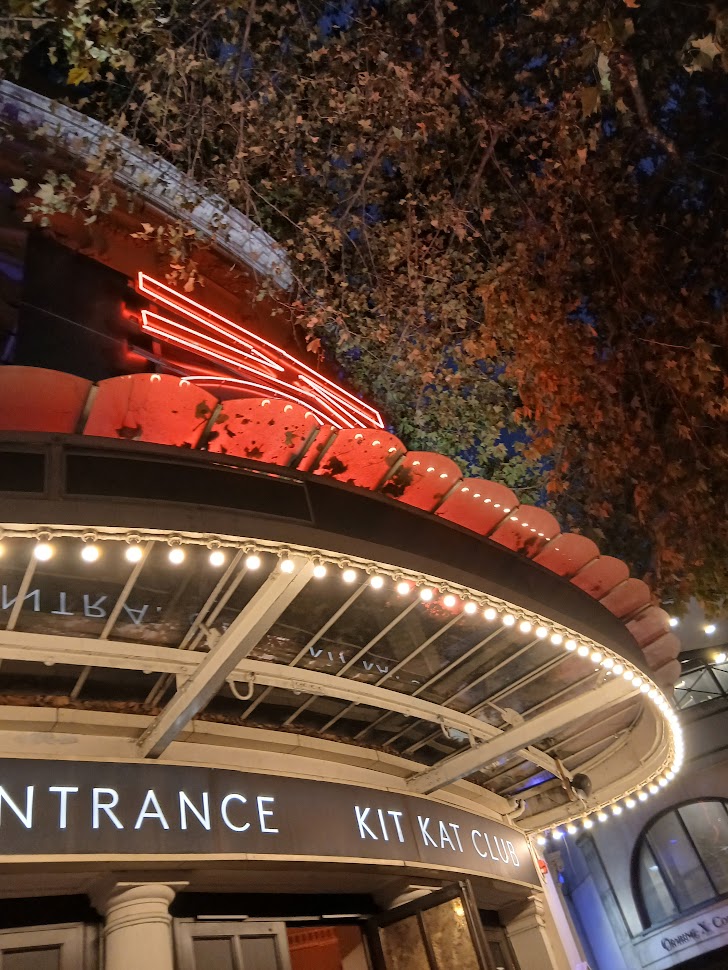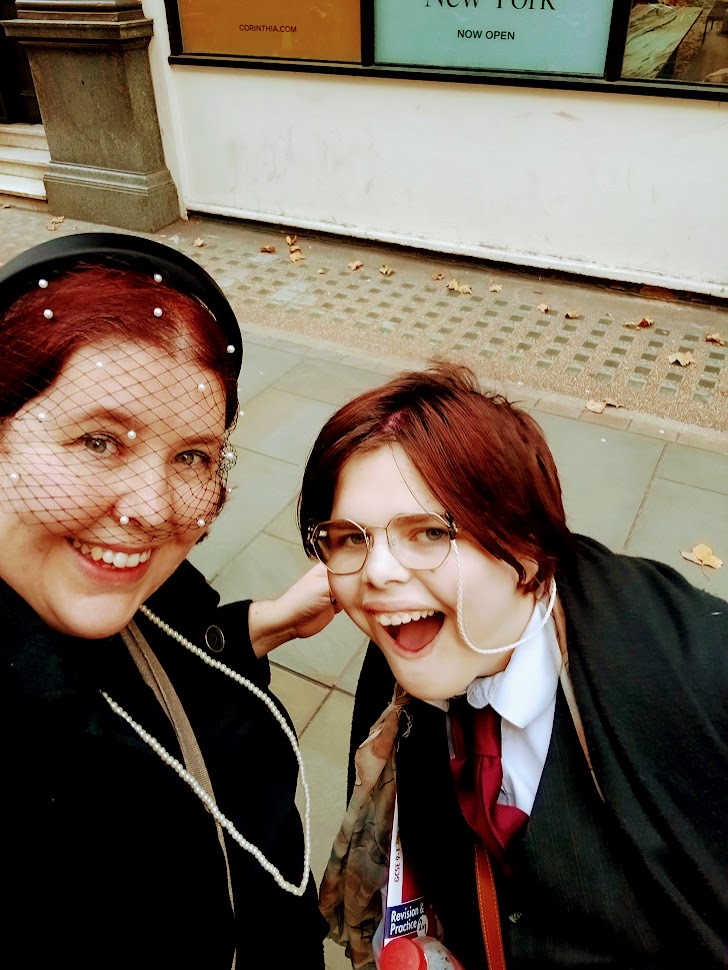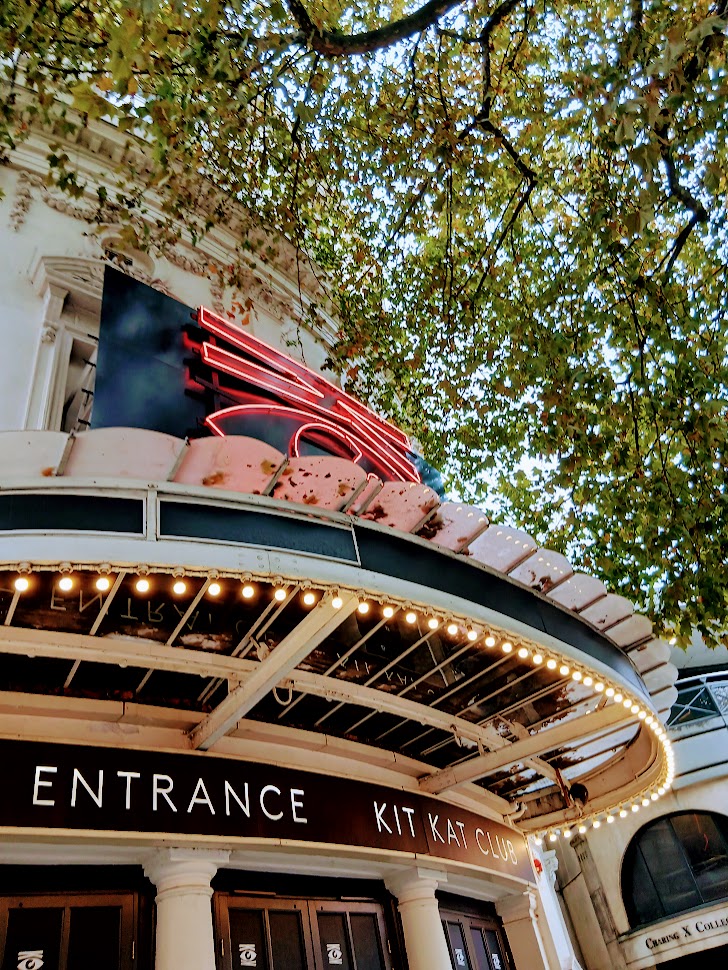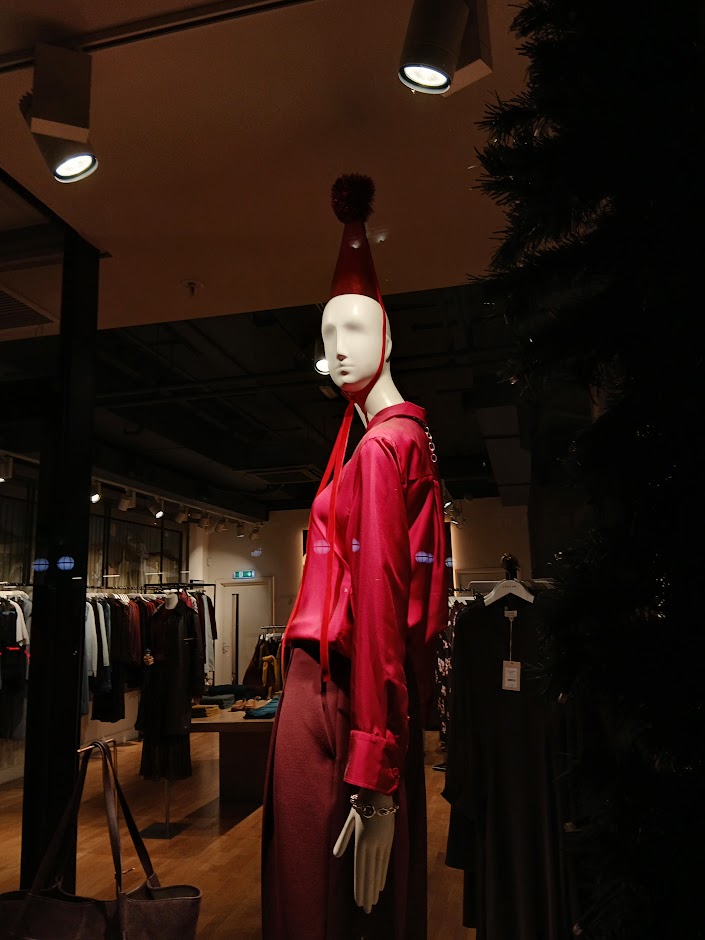5th November is certainly a time for remembering things and so it was probably appropriate that I used a day’s annual leave to take VK to the KitKat Club (AKA the Playhouse Theatre) to remember what life is like under the creeping influence of extremism. It’s a timely reminder, as is the reminder not to drink Schnapps in the middle of the day when you haven’t had lunch. But more on that later. First, tho, a quick visit to see the Guido Fawkes himself at Charing Cross:
Followed by a walk down the world’s longest corridor, which had VK asking whether we would ever see daylight again. Just then, we spotted a sign saying “there is light at the end of the tunnel” and with that, we emerged into the greylight of The Strand and headed down Northumberland Avenue.
Anyway, turns out the Playhouse Theatre is at the other end of Northumberland Avenue and we probably should have stayed on the tube to Embankment. Ah, well.
We weren’t allowed to take photos inside the KitKat Club so here’s a last image of us on the pavement before we joined the queue:
It’s a strict 13+ rated show so VK is only just old enough but there was a school trip also in the queue so I wasn’t the only one exposing innocent teenagers to Weimar decadence. My teen is pretty obsessed with Weimar Germany at the moment, as it happens, so this was a perfectly-timed outing. The marketing suggests it’s a very adult environment but don’t worry if you are taking a teen – it’s all pretty campy and tame really. As well as the school trip, the audience around us was made up of tourists and older people so it wasn’t quite the den of debauchery that some of the publicity might suggest.
When I say it was perfectly-timed, there was one drawback. I had booked because of the current leads – Eva Noblezada and Reeve Carney. I’ve mentioned before that VK loves “Hadestown” and, as we’d wanted to see “Cabaret” for ages, this seemed just right. We’d missed out on seeing their Musical Con 2025 slot because they were on the Sunday and we only went on the Saturday so maybe this time we’d be lucky?
We were not. I’d heard on social media that they had recently got married, which made me panic that they wouldn’t be appearing in London this week. So I had a look at Eva Noblezada’s Instagram and, sure enough, they were taking a break and returning on 6th Nov. My panic was justified and, turns out, we had actually timed it pretty badly. I broke the news to VK and she took it pretty well but I still feel slightly aggrieved that the information is only in small letters on one part of the website (“About”) instead of being highlighted when you’re booking. We still wanted to see the show and it’s always interesting to see understudies but I do wish we’d at least been told. Even yesterday morning, I spotted four ads for the show in my Facebook news feed and they all heavily featured the Hadestown two.
Anyway, I don’t intend to write a negative review for the sake of it. As the Emcee says, you have to leave your troubles outside the KitKat Club…they will have no troubles inside. So who am I to take my booking troubles and let it influence my review?
The first thing to know is that this is an immersive theatre experience. Although the Playhouse Theatre has this traditional-looking entrance, it is not open before the show:
Instead, you’re admitted through a metal curtain that leads down the stairs into a seedy basement club where someone is playing the piano in raucous 1920s style. We were asked to present our phones on entry and have a sticker put over the camera, which is why I didn’t take any photos of the interior. You’ll just have to trust me that it was very highly themed and decorated, with lots of detail everywhere. You can also trust me when I say that having a teen who’s phobic about stickers means that this censorship method also ensures that the teen won’t even touch their phone until you’re back out the other side. A VK-repellent if you will.
There are signs telling you not to touch the performers and I wondered why that was necessary but the performers do get very close to the punters, so I can see how there might be misunderstandings if the rules aren’t made explicit. One unsuspecting man was ordering a drink in the Gold Bar while a scantily clad performer leant off the balcony above the bar and pretended to tickle his bald head. The performers clearly know the boundaries so I can see why it’s important to let the audience know too. There was dance and accordion music in the Gold Bar, which all added to that Weimar feel.
You’re instructed to get to the venue an hour before the show to wander around the various bars and have a drink but we ended up getting to our seats quite early. I think there’s an option to dine before the show if you’re on one of the cabaret tables but we were up in the Dress Circle, which was traditional theatre seating, so I don’t think that was possible without an upgrade.
The timing of arriving at 1 meant leaving home at 12, which meant that I didn’t have time for lunch before we went in. And they give you a complimentary shot of Schnapps on entry (not for the 13-year-old), which can be edgy so early in the day. Combined with the eerie green light in the corridors, the twisting staircases and the sinister music being piped through, it does combine to make you feel like you’re in a David Lynch film. I spent a long time wandering around trying to find the loos and ended up in the Upper Circle, having climbed around sechzig stairs to get there. The loos nearest our seats were labelled as “Urinale” (yes, the signs were all in German as well as English) so I didn’t think they were meant for women. Later tho, VK found an entirely different set of loos which were entirely urinal-free. I’m normally quite good at navigating theatres but this was a bit disorientating. Which I assume is all part of the experience – I imagine that the real KitKat Club would have been much the same.
So, onto the show! I haven’t watched the film for a few years so I don’t know it as well as I do some other musicals…still, I have ideas about how these roles should be performed and I imagine others do too. There were some distinctly different interpretations of the songs to the Liza versions but I’ll get on to that later.
The show starts with a spotlight on the Emcee, who was played by Joe Atkinson in the performance we saw. The Emcee is a curious character, who never really reveals his true feelings or motivations. Everything is very staged and it’s not clear whether he supports or opposes the Nazi party – like Uncle Max, he encourages everyone to turn a blind eye to what’s going on and just enjoy the show. His initial “we’ll have no troubles in here” sounds very sinister by the end. Joe Atkinson does a great job of balancing these elements and his performance of “Money” was described to me by VK as “iconic”.
The show is performed in the round, with no scenery at all but with a rotating stage and a trap door middle, both of which are used in “Hadestown” and, I think, “Hamilton”. There isn’t a super strong narrative to “Cabaret” so it’s all about the performances and characterisation. Fortunately, there are strong characters to work with…as well as the aforementioned Emcee, there’s the wilful Sally Bowles (Marina Tavolieri), the socially awkward writer Clifford (Baker Mukasa) and the two older characters that have their own, very sweet romance – Fraulein Schneider (Ruthie Henshall) and Herr Schulz (Robert Hands).
Most of the action actually happens away from the KitKat Club, in Fraulein’s boarding house or, as in an early scene, a Berlin-bound train…so you can see why they didn’t go too heavy on the set dressing. Two notes on that train scene – firstly, there is a curious artistic choice to have the conductor speak German to Herr Ludwig while asking for his passport and inspecting his case. I understand that it’s because two Germans are talking to each other but that happens throughout the show and every other interaction is in English, regardless of whether the two native English speakers (Cliff and Sally) are in the scene or not. I didn’t have a problem following the dialogue as it’s fairly easy German but can’t help wondering what others made of it. Secondly, the scene takes place at the German border and then all of a sudden, they arrive in Berlin. Isn’t Berlin several hundred miles from the border with France? But now I’m nitpicking.
It also struck me how similar the plot is to “Moulin Rouge” – impoverished writer arrives in foreign city and falls in love with a showgirl – but hey, Cabaret was there first.
The other way it resembles “Moulin Rouge” is the creeping threat in the background, the idea of something evil growing amid the glamour. Here it’s the rising power of the Nazis, who are initially dismissed as “just another party” but whose ideas insidiously take over during the course of the plot. There are a couple of shocking moments, which I won’t spoiler, but each time there was a collective intake of breath as they happened. I liked that the symbolism of shattered glass remained on the stage throughout the second act, showing that once a window has been broken, it stays broken. The first time “Tomorrow Belongs to Me” is performed, it’s a little disappointing as it’s all a bit abstract and doesn’t share the sense of the film version, where suddenly everyone around the main characters is part of this same machine. However, I was wrong to be disappointed as the reprise during an engagement party brings exactly that sense – the friends and neighbours of Fraulein Schneider are the ones who are embracing this new narrative and it’s terrifying.
As a Jewish person living in 2025, there’s so much more I could say on this but let’s not lose focus on the production itself. Given I’ve watched this and “The Book Thief” recently, I think I need to see “The Producers” next to get some Jewish humour counterbalance to all this darkness.
A word on the performances – as we got absorbed into the plot, I forgot about the disappointment of not seeing Reeve and Eva, which I would say is a good sign. Marina Tavolieri played Sally as both brash and vulnerable, especially during “Cabaret” at the end. It’s an interesting choice and I don’t know whether it’s part of this particular production or whether it was an individual performance but it’s sung very shakily, with regret and disillusionment. It makes sense from a character POV but it’s a bit like Anne Hathaway’s “I Dreamed a Dream” – sometimes you want the power of the song, as well as the emotion. The film version of the song is defiant whereas this was defeated, which I realise was an artistic choice but it didn’t 100% work for me from a musical standpoint. Her “Maybe This Time” was fabulous tho, as it had the same vulnerability but a lot of power behind it. If you’re wondering what my armchair-psychiatrist child has diagnosed Sally with, it’s ADHD. I have to say I agree.
I’m also not sure why the pairs of performers cast are the Emcee and Sally, as if those two are the main roles. Clifford is the protagonist and arguably has more stage time than either of them. It would make more sense for a pair of performers coming into the show to play Clifford and Sally, especially if they happen to be a married couple. That’s just my thought tho. The Emcee is pivotal but barely even shares a stage with Sally, whereas Clifford is, in effect, Sally’s partner for most of the show, despite being a closeted gay man.
Oh, and if you’re wondering whether the age rating is suitable then I’d say there are a few awkward moments and lots of explicit sexual references but in a very vaudeville kind of way. The school kids behind us sniggered a bit but there’s nothing in the show that a broad-minded teen shouldn’t see. It does deal a lot with the issue of sexuality and that’s explored through many of the characters’ stories – not just Clifford and Sally but also Fraulein Schneider and Herr Schultz and Fritzie and her sailors. They didn’t ask for ID at the door but definitely not one to try and sneak a small child into.
Back to Clifford, and he was ably played by Baker Mukasa. He’s very much the observer, briefly in Sally’s orbit but never really allowing himself to get fully drawn in. The scene near the end where he uncharacteristically loses control for a moment was very well done and with the right amount of restraint. It’s not as showy a role as others but it was very well done.
Similarly, the secondary characters – Fraulein Schneider and Herr Schultz – are not very showy but they were VK’s favourites and with a West End veteran like Ruthie Henshall in the role, you know you’re in for a treat. Their story brought a lump to my throat and I’ll never think of a pineapple in the same way again.
I realise I’m rambled on for quite some time and probably haven’t told you anything useful but I would say we both enjoyed it. VK has been singing “Maybe This Time” ever since and is planning on rocking the HP Christmas Fayre with her rendition. This production is not exactly like the film version and there are choices that might prove divisive but it’s a powerful retelling of the story and, once again, very timely. On a practical note, I should tell you that the first half is a full hour longer than the second half, which is slightly odd but just be prepared for that and don’t down a full stein because if you go in search of the loos, you might never come back.
It was a surreal thing to go to as a matinee because it’s so focused around nightlife but, this being November, it was dark when we emerged at 16:45. We went in search of dinner and, along the way, found this Emcee-like mannequin:
We decompressed with burgers and fries, which helped soak up the early afternoon spirits. I’d be interested in seeing the show again with different leads but, actually, the experience is more important than the exact cast I’d say. And it is quite an experience. Just remember to leave your troubles outside….








